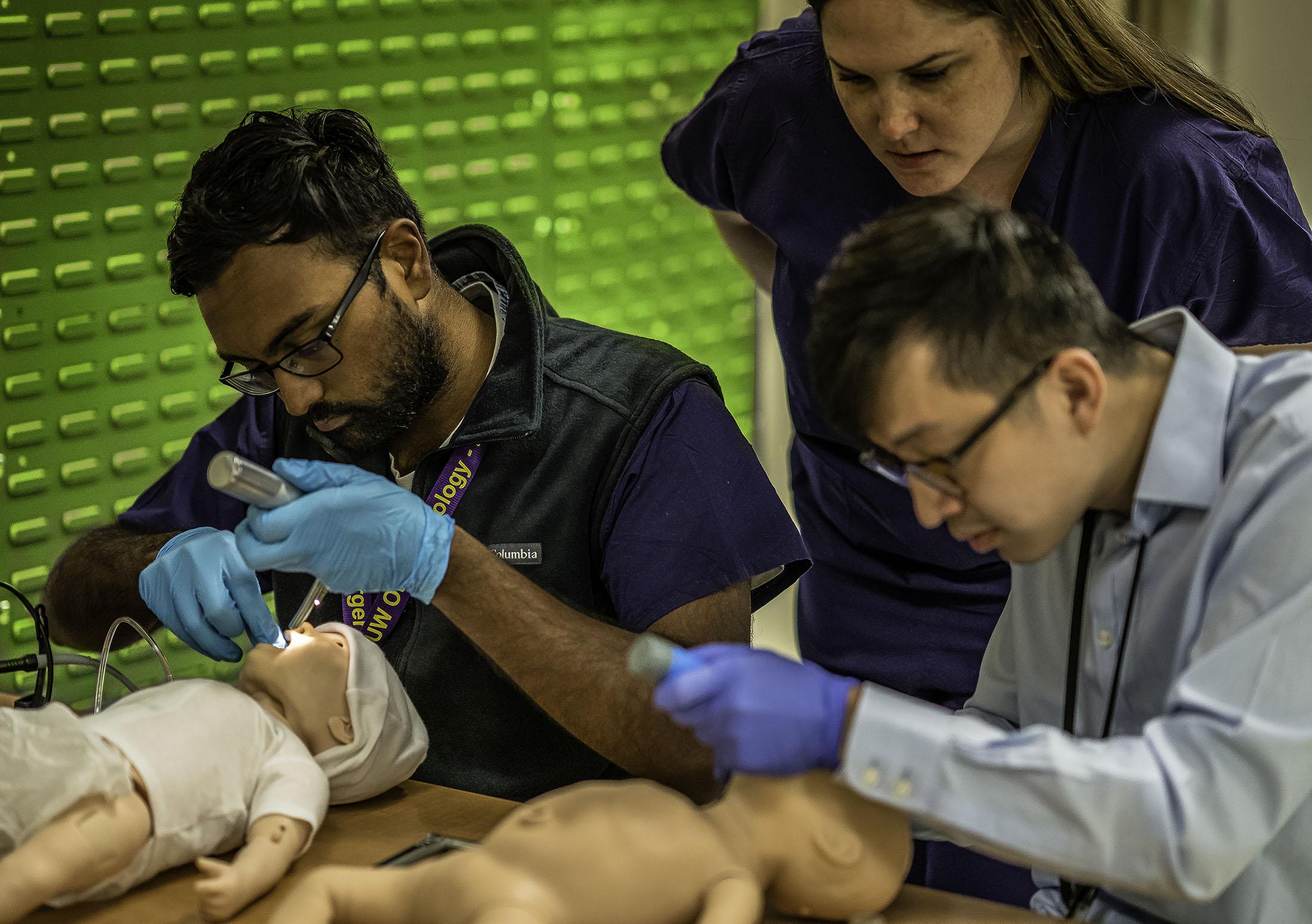Checking out the Field of Otolaryngology: What to Anticipate When You Seek Advice From an ENT
Otolaryngology, generally described as ENT, encompasses the diagnosis and treatment of ear, throat, and nose conditions. For those experiencing related issues, seeking advice from an ENT specialist can give clarity and alleviation. Comprehending what to expect during such assessments is essential for effective communication and care. This overview will certainly describe vital aspects of the ENT experience, consisting of common reasons for check outs and the procedures entailed in diagnosis and therapy.

Comprehending Otolaryngology: An Introduction
Otolaryngology, frequently described as ENT (Nose, ear, and throat) medicine, is a specific branch of medicine that concentrates on the diagnosis and therapy of problems affecting these crucial locations of the human body. This field includes a vast array of conditions, including those pertaining to hearing, equilibrium, respiratory system feature, and speech. Otolaryngologists are educated to manage both medical and medical treatments, using advanced techniques and modern technologies. Their experience expands beyond standard disorders, resolving issues such as allergic reactions, sinus infections, and hearing loss. In addition, they play a crucial function in the monitoring of head and neck cancers, supplying thorough care customized to specific person demands. Overall, otolaryngology stays necessary for maintaining health and lifestyle in damaged people.
Typical Reasons to See an ENT Specialist
Many individuals look for the knowledge of an ENT professional for a selection of reasons, mirroring the diverse nature of conditions that influence the nose, throat, and ear. Common problems consist of persistent sinusitis, which usually results in relentless nasal congestion and facial pain. Allergies and their linked symptoms, such as sneezing and itching, likewise trigger visits to these experts (Hearing). Hearing loss, whether progressive or abrupt, is another significant reason for examination. Additionally, people might seek evaluation for throat problems, including consistent hoarseness or swallowing problems. Sleep apnea, identified by interrupted breathing throughout rest, is often attended to by ENT experts. Each of these conditions highlights the importance of specialized care in handling complicated ENT-related health and wellness problems
Preparing for Your ENT Appointment
When planning for an ENT consultation, it is necessary to collect appropriate information and consider any kind of particular issues. Patients need to put together an in-depth medical background, consisting of previous ear, nose, or throat issues, surgical procedures, and present medications. Recording signs-- such as regularity, seriousness, and duration-- can offer valuable understandings for the ENT specialist. Furthermore, people should prepare a checklist of questions they want to ask, guaranteeing that all problems are resolved during the visit. Bringing along any type of pertinent clinical documents or examination outcomes can further help the ENT in recognizing the client's problem. Patients should verify their consultation information, consisting of date, time, and area, to minimize any last-minute complication. Correct prep work can boost the performance of the consultation and result in much better end results.
What to Anticipate Throughout the Assessment
As the appointment starts, the individual can expect to engage in a detailed discussion with the ENT expert about their symptoms and case history. The expert will make inquiries about the duration, regularity, and intensity of signs such as hearing loss, nasal congestion, or sore throat. In addition, the individual's previous medical problems, medicines, and any type of relevant family history will certainly be examined, assisting the professional in forming a full understanding of the person's wellness. The ENT may also inquire about lifestyle variables, such as exposure to toxic irritants or allergens. This open dialogue develops a foundation for the assessment, ensuring that the client's problems are addressed and setting the stage for any kind of required examinations or referrals for therapy.
Analysis Examinations and Procedures in Otolaryngology
A variety of diagnostic tests and treatments are crucial in otolaryngology to accurately evaluate and diagnose problems influencing the nose, throat, and ear. Common examinations consist of audiometry, which gauges hearing feature, and tympanometry, analyzing middle ear stress. Nasal endoscopy enables visualization of the nasal passages and sinuses, while laryngoscopy analyzes the throat and singing cables. Imaging strategies, such as CT scans and MRIs, provide comprehensive sights of head and neck structures. Allergic reaction testing may also be conducted to determine triggers for sinus or breathing issues. These diagnostic tools allow ENT specialists to create a detailed understanding of patients' conditions, ensuring tailored and effective administration plans. Proper diagnosis look at more info is vital for successful treatment outcomes in otolaryngology.
Treatment Choices Used by ENT Specialists
ENT professionals provide a variety of treatment choices customized to attend to particular problems affecting the ear, throat, and nose. These therapies vary from conservative approaches, such as medicine and way of living adjustments, to more intrusive treatments. For instance, allergies may click this be managed with antihistamines or immunotherapy, while persistent sinus problems may need nasal corticosteroids or sinus surgical treatment. For hearing loss, ENT specialists frequently recommend listening devices or surgical treatments like cochlear implants. In instances of throat conditions, options can consist of speech treatment or surgical treatments to eliminate obstructions. In addition, they may provide assistance for handling sleep apnea, consisting of using CPAP devices or medical treatments. In general, the objective is to improve patients' lifestyle via customized treatment and effective therapy strategies.
When to Look For Follow-Up Treatment With an ENT
Recognizing when to look for follow-up care with an ENT professional is crucial for managing continuous signs or difficulties associated with throat, nose, and ear conditions. Patients ought to consider arranging a follow-up visit if signs persist in spite of preliminary therapy, such as chronic ear pain, nasal congestion, or throat discomfort. Changes in hearing, balance issues, or unusual nasal discharge may also call for more assessment. Furthermore, if an individual experiences side results from prescribed medications or has undergone a surgery, follow-up treatment is very important to monitor recuperation and resolve any kind of problems. Prompt consultations can guarantee reliable monitoring of conditions, avoid possible issues, and provide tranquility of mind regarding one's wellness. Looking for follow-up care promotes aggressive health and wellness management in otolaryngology.
Frequently Asked Inquiries

What Credentials Should I Seek in an ENT Professional?
When looking for an ENT expert, one need to look for board accreditation, pertinent experience, and solid client testimonials. Additionally, reliable interaction skills and a caring approach can greatly improve the total treatment experience.
How Do I Pick the Right ENT for My Needs?
Picking the ideal ENT specialist involves assessing their credentials, experience, and person testimonials (ENT Clinic). It is necessary to ponder their communication design and approach to therapy, guaranteeing they line up with the person's specific wellness requirements and choices
Exist Any Threats Connected With ENT Procedures?
The risks related to ENT procedures might consist of infection, blood loss, anesthetic problems, and potential damages to bordering structures. Individuals need to review these dangers with their physician to recognize individual worries and guarantee educated decisions.
How Can I Handle Stress And Anxiety Prior To My ENT Appointment?
To manage anxiety prior to an appointment, individuals can practice deep breathing workouts, envision favorable end results, prepare questions beforehand, and look for support from good friends or family, fostering a feeling of confidence and calmness.
What Should I Do if I Experience Negative Effects From Treatment?
If side effects from treatment take place, the individual should quickly report them to their medical care supplier. Modifications to treatment or additional interventions might be needed to ensure security and efficiency in managing their condition - ENT Clinic. As the appointment starts, the client can expect to engage in a complete conversation with the ENT professional regarding their symptoms and medical history. These analysis devices allow ENT professionals to establish an extensive understanding of individuals' problems, guaranteeing customized and efficient this monitoring plans. ENT specialists use a selection of treatment alternatives tailored to attend to certain conditions impacting the throat, nose, and ear. When looking for an ENT specialist, one need to look for board qualification, pertinent experience, and strong individual evaluations. Choosing the ideal ENT specialist involves reviewing their credentials, experience, and individual reviews